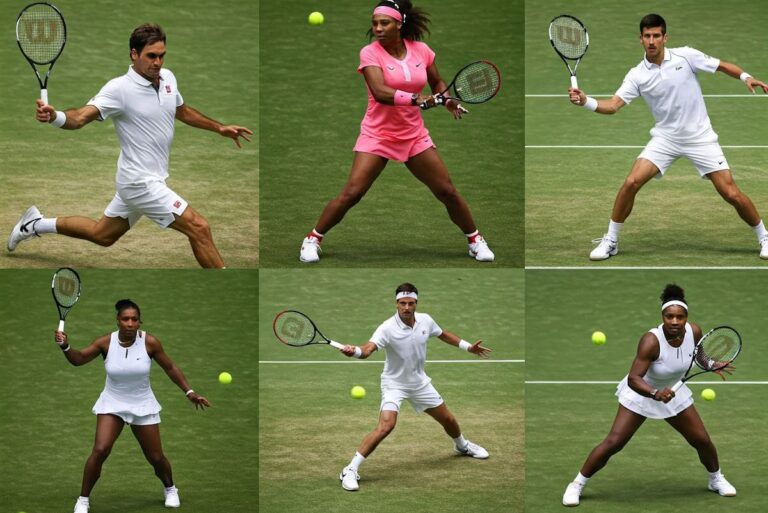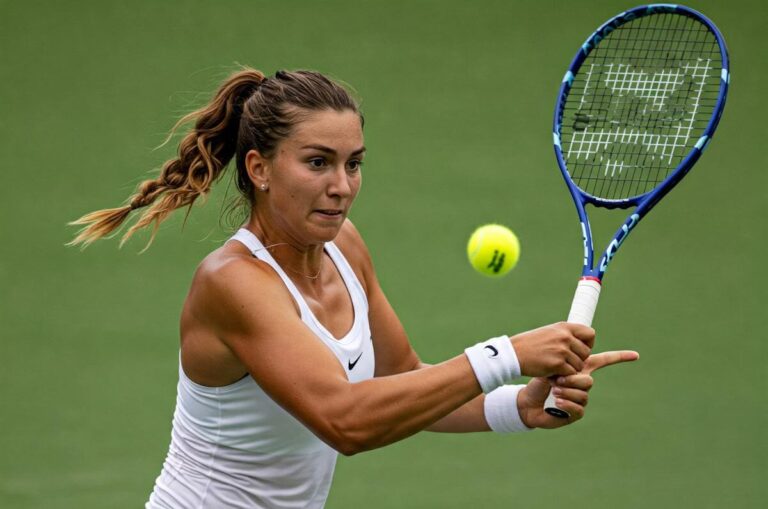Introduction to Tennis Nutrition
Nutrition plays a crucial role in tennis, a sport that demands not only physical prowess but also mental acumen. The significance of proper fueling for athletes cannot be overstated, as it directly influences performance, stamina, and recovery. In the context of tennis, players engage in intense matches that can last for several hours, requiring sustained energy and focus. Therefore, understanding the dynamics of tennis nutrition is essential for players aiming to enhance their game.
A well-balanced diet aids in the preparation for matches, helping tennis athletes maintain energy levels and optimize their physical capabilities. Carbohydrates, proteins, fats, vitamins, and minerals each play a vital role within an athlete’s dietary framework. Carbohydrates serve as the primary energy source, fueling the high-intensity bursts characteristic of tennis. Moreover, proteins are essential for muscle repair and recovery, while healthy fats contribute to overall energy balance and long-term endurance.
Beyond physical requirements, nutritional strategies in tennis must also incorporate pre- and post-match protocols. What players consume before a match can influence their performance on the court, as timely, appropriate fueling is essential for maintaining energy levels and focus. Similarly, post-match nutrition is vital for recovery, allowing players to replenish glycogen stores and support muscle repair.
Overall, tennis nutrition transcends mere food choices. It involves strategic planning tailored to the unique demands of the sport. By recognizing the interconnectedness of nutrition with athletic performance and recovery, players can optimize their training regimes and enhance their overall effectiveness on the court, ensuring that they remain competitive in this physically and mentally demanding game.
Understanding Your Nutritional Needs
For tennis players, understanding nutritional needs is crucial for optimizing performance and maintaining overall health. The three primary macronutrients—carbohydrates, proteins, and fats—each fulfill distinct roles that are essential for athletes engaged in this physically demanding sport.
Carbohydrates are the primary source of energy for tennis players. They provide readily available fuel that supports high-intensity physical activity. Consuming carbohydrates before a match helps ensure that energy stores are maximized, which can improve sprinting speed and endurance on the court. It is generally recommended that tennis players consider a diet where carbohydrates comprise about 55-65% of their total caloric intake. This ratio facilitates sustained energy levels throughout training sessions and matches.
Protein, another vital macronutrient, is essential for muscle repair and recovery. Tennis is not only a game of endurance but also requires quick bursts of power and strength. Protein helps rebuild muscle tissues that may undergo strain during matches and training. For tennis players, it is recommended that protein should make up about 15-20% of daily caloric consumption, with sources such as lean meats, dairy, beans, and legumes being particularly beneficial.
Fats, while often misunderstood, play an important role in an athlete’s diet as well. They provide a concentrated source of energy and are significant for maintaining hormonal balance and cellular function. Healthy fats should account for about 20-30% of total daily caloric intake. Foods like avocados, nuts, and olive oil can contribute positively to overall energy and performance levels.
A tennis player’s hydration needs are also critical. Proper fluid intake is essential to prevent dehydration, which can negatively impact performance. The amount of water required can vary based on factors such as training intensity and duration, and players should be proactive in monitoring their hydration status before, during, and after matches.
In summary, understanding these nutritional requirements and adjusting them according to personal training needs can significantly impact performance on the tennis court.
What to Eat Before a Match
Proper nutrition before a tennis match is crucial to ensure athletes perform at their peak. The right pre-match meal or snack should be rich in carbohydrates, which serve as the primary fuel source for high-intensity sports such as tennis. Consuming the right foods can enhance endurance and improve concentration, making it essential for players to choose wisely.
Ideally, the pre-match meal should consist of easily digestible carbohydrates. Foods such as oatmeal, bananas, whole-grain bread, or rice are excellent options. These foods help maintain steady energy levels throughout the match. It is advisable for players to consume their main meal about three to four hours before stepping onto the court. This allows sufficient time for the body to process the food and convert it into usable energy.
In terms of snacks, players can opt for a light combination of carbohydrates and protein about one hour before a match. Options such as yogurt with fruit, a peanut butter sandwich, or energy bars can provide a quick energy boost. When selecting snacks, it is essential to avoid overly fatty or fibrous foods, as they can lead to gastrointestinal discomfort during play.
Hydration is another vital aspect of pre-match nutrition. Players should ensure they are well-hydrated before the game, drinking water consistently in the hours leading up to the match. Electrolyte drinks can also be considered, particularly in hot weather or if the match lasts for an extended duration. Maintaining fluid balance is critical for optimal performance, as dehydration can significantly impair physical abilities.
In sum, a well-planned approach to pre-match meals and snacks can make a significant difference on the court. Emphasizing carbohydrates, proper meal timing, and adequate hydration will provide tennis players with the necessary energy to excel in their matches.
Foods to Avoid Before a Match
Preparation for a tennis match extends beyond skills and strategies; it also encompasses nutrition. The foods consumed prior to a match can significantly impact performance, making it crucial to select options that support optimal energy levels and avoid those that could hinder physiological efficiency. Firstly, heavy and greasy foods should be avoided. Items such as fried foods, fast-food burgers, and oily pizza can lead to discomfort by slowing down digestion. Such meals require considerable time to break down, which may leave athletes feeling sluggish on the court. Instead, players should consider lighter meals that include lean proteins and complex carbohydrates.
Additionally, high-fiber foods can be problematic for tennis players before a match. While fiber is an essential part of a balanced diet, consuming it in large quantities shortly before competing may result in gastrointestinal distress, leading to cramps and a feeling of fullness. Foods like beans, lentils, and cruciferous vegetables, although nutritious, should be minimized prior to competition. Instead, players can opt for low-fiber alternatives such as bananas or white rice, which provide the necessary carbohydrates without risking digestive issues.
Moreover, certain drinks also warrant caution; carbonated beverages and those high in caffeine can lead to dehydration and discomfort during intense physical activity. Players should avoid soda and energy drinks as they may cause a bloated feeling on the court. Instead, hydration should primarily come from water or sports drinks that replenish electrolytes without excessive sugar or artificial ingredients. By being mindful of food choices, athletes can ensure they arrive at the court feeling energized and ready to perform at their best.
In-Match Nutrition Strategies
During a tennis match, maintaining optimal energy levels is crucial for players aiming to perform at their best. The high-intensity nature of the sport, characterized by quick sprints, repeated bursts of energy, and the mental focus required, necessitates a well-thought-out in-match nutrition strategy. Players often encounter fatigue as the match progresses, and the right nutrition can help sustain their performance and concentration.
One effective way to replenish energy during a match is through quick snacks. Energy gels are designed to provide a concentrated dose of carbohydrates, delivering a rapid source of energy that can be immediately utilized. These gels are convenient, compact, and can be consumed in seconds, making them an excellent choice during changeovers. Hydration is also a critical factor in maintaining performance; electrolyte drinks can help replace lost minerals such as sodium and potassium, which are vital for muscle function and endurance. When choosing an electrolyte drink, players should aim for those that not only replenish fluids but also offer a balanced amount of sugars for sustained energy release.
Another beneficial option is a simple banana. Rich in carbohydrates and potassium, bananas provide a quick energy boost along with essential nutrients that can help prevent muscle cramps. Players may consume a banana during a break to sustain their energy levels without feeling overly full.
Timing is also an essential aspect of in-match nutrition. For longer matches or tournaments, players should plan when to consume these snacks strategically. It is advisable to incorporate quick energy sources at approximately every hour or as fatigue begins to set in, ensuring there is enough fuel to remain competitive throughout the match. By employing these in-match nutrition strategies effectively, players can maintain their energy levels, enhance performance, and improve their chances of success on the court.
What to Eat After a Match
Post-match nutrition is vital for athletes, particularly tennis players, who require effective recovery strategies after a grueling match. Consuming the right nutrients immediately following competition can significantly influence recovery speed and overall performance in subsequent matches. Ideally, tennis players should aim to eat within the first 30 to 60 minutes post-match. This timing is critical, as the body is primed to replenish glycogen stores and promote muscle repair during this period.
To facilitate recovery, it is essential to focus on meals that provide a balanced combination of carbohydrates and proteins. Carbohydrates are crucial for restoring glycogen levels depleted during intense physical activity, while protein supports muscle repair and growth. A general recommendation is to aim for a ratio of approximately 3:1 carbohydrates to protein. For example, a turkey sandwich on whole-grain bread can serve as an excellent post-match option, delivering both complex carbohydrates and lean protein. Alternatively, a smoothie made with banana, Greek yogurt, and a scoop of protein powder can also be an effective and easily digestible choice.
Additionally, incorporating hydration into the recovery process is equally important. Replenishing fluids lost during a match helps maintain optimal physiological function. Water is essential, but including an electrolyte-rich drink can further enhance recovery, especially after prolonged matches. Furthermore, other nutrient-dense foods such as quinoa, salmon, or chickpeas can be included in meals consumed after a match to provide additional proteins and healthy fats.
In conclusion, prioritizing post-match nutrition is essential for tennis players seeking to optimize their recovery. By strategically timing meals and focusing on a blend of carbohydrates and proteins, players can enhance their recovery process, sustain their performance levels, and prepare their bodies for future competition challenges.
Hydration: A Key Component
Hydration is an essential aspect of tennis nutrition, as it significantly impacts an athlete’s performance and recovery. Proper fluid intake before, during, and after a tennis match is crucial for maintaining peak performance, energy levels, and overall health. Research suggests that players should aim to consume approximately 16 to 20 ounces of water at least two hours before a match. This pre-hydration helps ensure that the body is adequately prepared for the physical demands of the game.
During the match, it is recommended that players hydrate with 7 to 10 ounces of fluid every 10 to 20 minutes, especially if the match lasts longer than 90 minutes. Water is the primary source of hydration; however, when temperatures soar or matches are particularly intense, the use of sports drinks may be beneficial. These beverages can replenish not only fluids but also important electrolytes such as sodium and potassium, which are lost through sweat. These electrolytes play a vital role in maintaining fluid balance, muscle function, and reducing the risk of cramping, ultimately enhancing performance on the court.
After a match, hydration remains critical for recovery. Athletes should aim to replace any lost fluids by consuming at least 20 ounces of water or a sports drink within two hours post-match. This aids in the restoration of hydration levels and supports optimal recovery processes. Monitoring hydration status can be easily accomplished by checking urine color, as a pale yellow indicates adequate hydration, while a darker shade suggests the need for increased fluid intake. By effectively managing hydration throughout the entire match experience, tennis players can enhance their performance, endurance, and facilitate faster recovery.
Supplements and Enhancements
In the realm of tennis nutrition, the role of supplements has become a subject of considerable interest among athletes seeking to enhance their performance. While whole foods should ideally form the foundation of a tennis player’s diet, certain supplements may offer additional benefits. Popular options include protein powders, branched-chain amino acids (BCAAs), and multivitamins. These enhancements can potentially support recovery, muscle synthesis, and overall health.
Protein powder, often derived from whey, casein, or plant sources, can aid in meeting the increased protein requirements of tennis players. Incorporating protein powder into a post-match recovery plan may help in muscle repair and growth, essential after intense physical exertion on the court. Similarly, BCAAs, which are three essential amino acids (leucine, isoleucine, and valine), can be beneficial in reducing muscle soreness and fatigue, contributing to better performance during practice and matches.
Additionally, multivitamins serve a crucial role in filling any nutritional gaps that a tennis player’s diet may have. Given the rigorous training schedules, these supplements help ensure athletes maintain optimal vitamin and mineral levels, which are vital for energy production and immune function.
However, it is crucial to approach supplementation judiciously. Not all athletes require the same level of enhancement, and individual needs can vary greatly. Therefore, consulting with healthcare professionals or sports nutritionists before embarking on any supplementation regimen is highly recommended. They can provide personalized advice based on specific health goals, dietary needs, and potential interactions with other medications or supplements. This professional guidance ensures that athletes make informed choices that will genuinely support their performance and well-being without risking adverse effects.
Creating a Personal Nutrition Plan
Establishing a personalized nutrition plan is essential for tennis players who wish to maximize their performance on the court. A well-rounded plan should consider individual needs, preferences, and specific training schedules, ensuring that nutritional strategies align with personal goals. To begin, players should assess their current dietary habits, noting what works and what might require adjustment. This self-assessment can guide the development of a more effective nutrition plan, tailored to enhance performance and recovery.
The first step in creating your nutrition plan involves setting clear, achievable goals. These might include improving endurance, increasing muscle strength, or optimizing recovery times. By defining these objectives, athletes can more effectively identify the nutrients necessary to support their performance. Protein, carbohydrates, and healthy fats should be integral components of any tennis nutrition plan, as they serve distinct roles in energy provision, muscle repair, and enhanced recovery.
Once specific goals are established, the next step is to gather information about preferred food sources. Incorporating foods you enjoy not only makes adherence easier but also promotes overall satisfaction with the diet. After identifying preferred foods, players can design meal plans that are both enjoyable and functional, aligning with pre- and post-match nutritional needs.
It’s also critical to monitor and adjust the nutrition plan as needed. Maintaining a food diary can be an effective strategy for tracking intake and understanding how dietary choices impact performance and recovery. Regularly evaluating one’s energy levels and recovery rates will allow adjustments to be made to optimize outcomes. Consultations with a sports nutritionist can also provide valuable insights and recommendations tailored to enhance your tennis performance through effective dietary practices.



